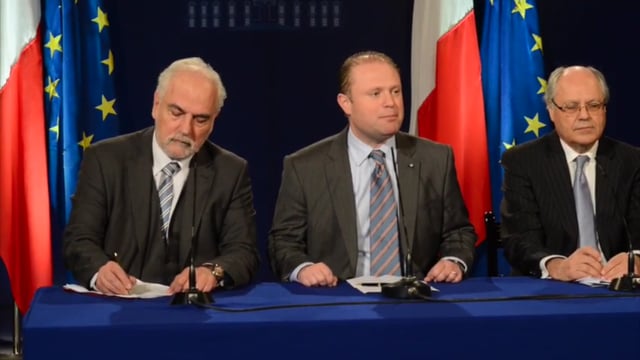Malta records lowest deficit in 20 years
Prime Minister Joseph Muscat says deficit target was met while allowing the economy to grow and cutting taxes


Malta has registered the lowest deficit recorded in the past 20 years, confirmed by both the National Statistics Office and Eurostat, the EU's statistical office.
Since 2012 when the deficit stood at 3.6%, Malta has been on the mend, reducing the deficit to 2.6% in 2013, 2.1% in 2014 and planning a further reduction to 1.6% this year.
Flanked by deputy prime minister Louis Grech and finance minister Edward Scicluna, Prime Minister Joseph Muscat expressed satisfaction at the government's success in meeting financial targets set for 2014.
"It is crucial to point out that there was skepticism around the budget presented for 2014, with a number of critics expressing doubts on the sustainability of the budget and the ambitious deficit targets," he said.
Although Malta is now well below the 3% Maastricht criteria, the European Commission is still considering whether Malta should be pulled out of the excessive deficit procedure. Although Malta is meeting both deficit and debt rules, it is up to the Commission to determine the way forward.
"We are honouring our end of the deal, respecting the rules and the figures. Our target is to continue following the rules," Muscat said.
The finance minister said the deficit target was met without killing the economy, placing Malta as a model of growth-friendly consolidation.
"It is something I speak proudly of in meetings with Euro finance ministers and we have shown that deficit can be reduced in a sustainable way," he said. Scicluna said the €320 million Shanghai investment helped to address past debts while the money generated from revenue was invested in education and health, among other sectors.
Louis Grech said Labour's electoral manifesto was being implemented according to a plan. "We registered economic growth without resorting to austerity measures," he said.
Muscat said the Labour administration was advocating a cultural change whereby the public service was being managed as if it were a private company. “We will continue on this path of discipline because, by necessity, we need to continue performing well, improving on the headway we have made,” he said.
The Prime Minister said the reduced deficit was achieved through an economic model – as opposed to an accounting exercise – based on incentivising economic growth and encouraging more people to join the workforce.
He said, that while the government had looked at cuts in government spending, capital expenditure for 2014 amounted to €300 million.
According to Grech, private consumption by end of 2015 is expected to increase by 25%.













.png)









